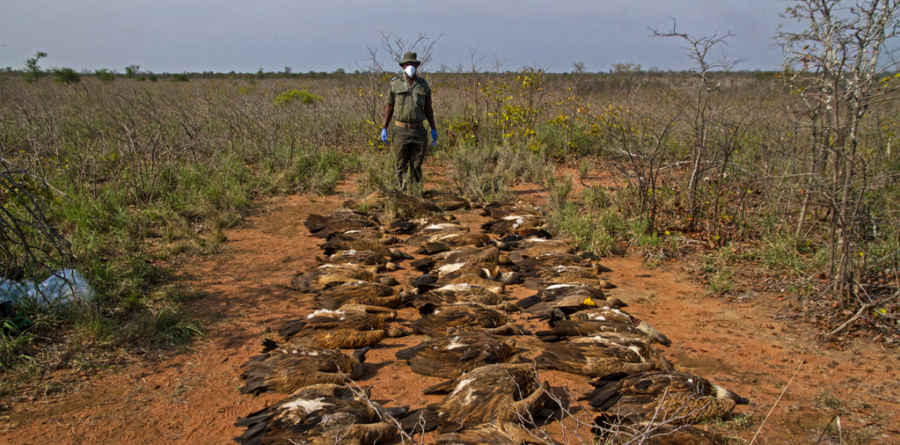Poaching doesn’t just kill elephants and rhinos. Too often these days there are other victims: vultures. In southern Africa, poachers lace the carcasses of their prime targets with powerful poisons that kill the magnificent birds of carrion.
The poachers’ aim is to evade detection by stopping the birds being seen from the air by scouts and the authorities. The result is devastating. Vultures are now also threatened by the illegal trade in body parts.
Andre Botha works with the Endangered Wildlife Trust, which in March hosted a workshop with prosecutors from southern Africa that was funded by the British High Commission in South Africa and DEFRA.
Here Andre blogs about these misunderstood, magnificent birds – and the measures being taken to save them.
Bearing the brunt of the onslaught
The most recent vulture poisoning incident that we attended was in southern Mozambique, about nine kilometres from the border with South Africa and southern Kruger National Park.
Ninety African White-backed Vultures and seven Hooded Vultures were killed.
Both species are critically endangered. Wildlife poisoning seems to be on the increase in southern and east Africa and a wide range of species are affected. African White-backed Vultures seem to be bearing the brunt of the onslaught. But all vultures are susceptible.
Belief-use poisoning
‘Sentinel poisoning’ is when vultures are killed to stop them alerting scouts to a kill. This has had a substantial impact on vulture populations in southern and eastern Africa.
It’s estimated that more than 3000 vultures have been killed in known incidents in the region since 2011. The known cases are however a fraction of what really happens out there Many incidents go undetected. We also talk about ‘belief-use poisoning’ – when vultures are killed for body parts mistakenly believed to have supernatural powers. There is a very clear link between wildlife poisoning and ivory poaching.
Kit ‘has led to 30% decline in mortality rates’
We’ve developed a Poison Response Kit, which is packed for issue to sites where we have conducted poisoning intervention training to conservation and law enforcement staff. It contains the basic materials to enable staff to conduct proper scene investigations, to collect and store samples, to treat any surviving animals and do a thorough scene decontamination. The kits have been used to good effect so far – but we definitely need to have more of them. We’ve trained more than 1,350 people to use these kits in eight African countries.
UK university involved
Evidence shows that in the areas where we’ve been able to present our training there’s been a more than 30% decline in vulture mortality rates.
The University of Reading is working with us and our other project partner The Hawk Conservancy Trust in quantifying the benefit and impact of the training and issue of kits while providing some financial support for the work that we are doing on the ground.
Current fines not adequate deterrents
There have been a number of successful prosecutions. The most notable was a two-year prison sentence handed to two poachers caught red-handed poisoning vultures in the Mkhuze Game Reserve in Zululand in 2012-2013.
Two farmers who admitted guilt to the negligent use of poison which resulted in the deaths of more than 100 Cape Vultures in KwaZulu-Natal and the Eastern Cape in 2013 were given fines – though the size of these fines meant that they will not serve as an adequate deterrent to others. Addressing this shortcoming in penalties is another matter that we are engaging the judiciary with.
Have your say
Are you shocked by the scale of the threat against vultures in Africa? What more should be done to halt their decline?
The UK is committed to tackling wildlife crime and will host a global conference on the illegal wildlife trade in October in London.

